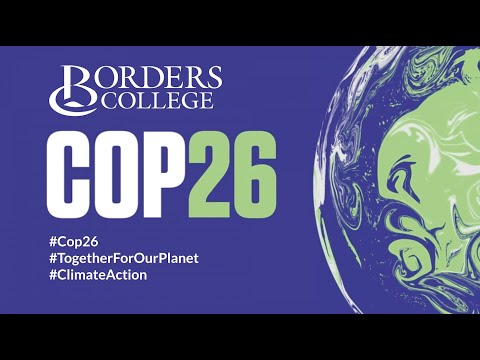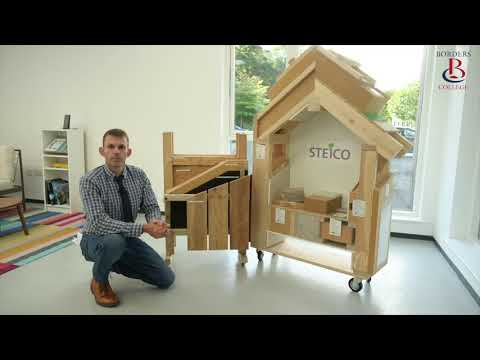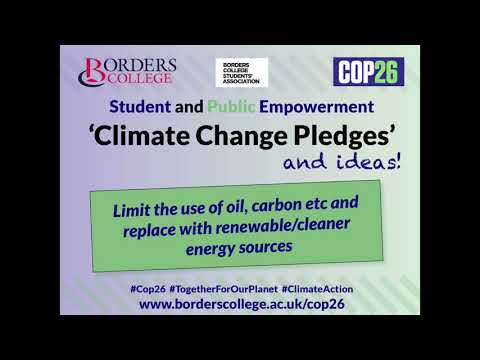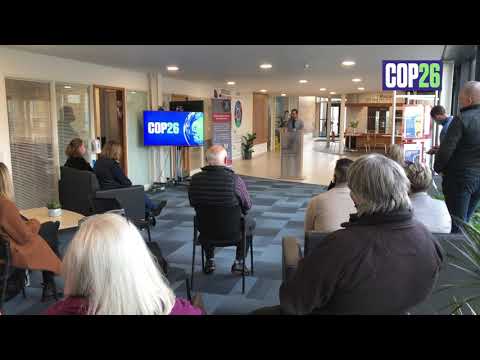COP26
Borders College hosted four events as part of COP26 with each event linked to the main themes of the 26th UN Climate Change Conference. The UK hosted the 26th UN Climate Change Conference of the Parties (COP26) in Glasgow on 31 October – 12 November 2021.
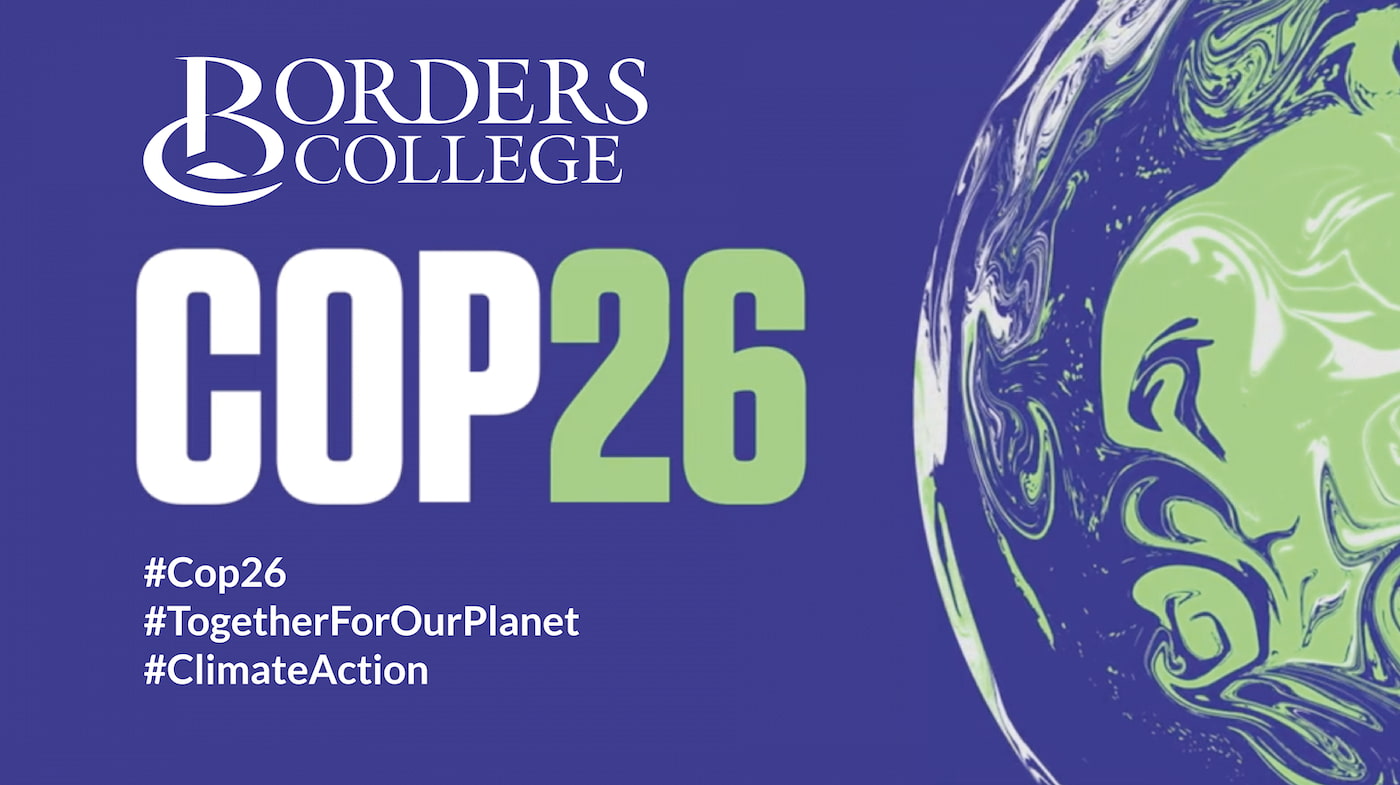
Sustainability and Leadership Online Presentation
Principal Angela Cox is joined by Dave Gorman, Director of Social Responsibility and Sustainability at University of Edinburgh and Sara Thiam, CEO of the Scottish Council for Development & Industry (SCDI) in an online conversation around Sustainability and Leadership.
Student & Public Empowerment Event.
Our Students’ Association has an ambition to ensure that the students at Borders College have an understanding of what the aims and objectives of COP26 are, and at the same time ask them to make a ‘Climate Change Pledge’ to help tackle the climate crisis as part of the bigger conversation on tackling climate change.
Business and Employers Forum.
Department of Enterprise and Business innovation.
The Department of Enterprise and Business Innovation hosted an event for employers to look at the practical changes they can make to address climate change in their organisations.
The speakers at the event included James Napier – Net Zero Community Scotland, Kristine Reilly – Beyond Healthy Homes and Richard Cook from Borders College.
Borders College COP26 Events Overview ♻️
| Borders College Event | Date | Linked to COP26 Theme |
|---|---|---|
Sustainability and Leadership.Principal – Angela Cox The climate emergency has redefined sustainability, taking it from a component of corporate social responsibility, escalating it to become a leadership essential, to be placed at the heart of all of our plans. This is our opportunity to continue our journey from good to great. We will demonstrate the importance of moving towards a more sustainable society through our work as an instigator of behavioural change, ensure relevance and impact on a global scale by committing to the circular economy and developing our staff and students to become global citizens.
|
01/11/21 |
WORLD LEADERS SUMMIT |
Sustainable Construction.
|
04/11/21 |
ENERGY |
Student & Public Empowerment Event.Borders College Students' Association Our Students’ Association has an ambition to ensure that the students at Borders College have an understanding of what the aims and objectives of COP26 are, and at the same time ask them to make a ‘Climate Change Pledge’ to help tackle the climate crisis as part of the bigger conversation on tackling climate change.
|
05/11/21 |
YOUTH AND PUBLIC EMPOWERMENT
|
Business and Employers Forum.Department of Enterprise and Business innovation. The Department of Enterprise and Business Innovation is hosting an event for employers to look at the practical changes they can make to address climate change in their organisations. There will be opportunities to look at renewables and green energy in our eco-house, hear from organisations about climate change issues in the Scottish Borders, renewable technology and training and visit our new robotics room to see how innovation in manufacturing may help in the move to net zero. The speakers at this event include James Napier – Net Zero Community Scotland, Kristine Reilly – Beyond Healthy Homes and Richard Cook from Borders College.
|
11/11/21 |
CITIES, REGIONS & BUILT ENVIRONMENT |
The above events are subject to change.
COP stands for Conference of the Parties.
Parties are the signatories of the United Nations Framework Convention on Climate Change (UNFCCC) - a treaty agreed in 1994 which has 197 Parties (196 countries and the EU).
The 2021 conference, hosted by the UK, together with our partners Italy, in Glasgow, will be the 26th meeting of the Parties, which is why it's called COP26.
United Nations climate change conferences are among the largest international meetings in the world. The negotiations between governments are complex and involve officials from every country in the world as well as representatives from civil society and the global news media.
The UK will host the 26th UN Climate Change Conference of the Parties (COP26) in Glasgow on 31 October – 12 November 2021.
Activity at a COP takes place in two different zones - the Blue Zone and the Green Zone.
The Blue Zone is for people registered with the UN body tasked with coordinating the global response to the threat of climate change – the United Nations Framework Convention on Climate Change (UNFCCC). In the Blue Zone you might be part of a national delegation, work for the United Nations and related organisations & agencies or be a member of the media or non-profit observer organisation.
In the Blue Zone, delegates from countries meet for both formal negotiations and informal consultations. They may also take part in meetings with other delegations to clarify their position and interests with the aim of reaching agreement or overcoming a negotiating deadlock. The UNFCCC will also host a range of events, including technical briefings, to support the negotiations process.
The Green Zone is for the general public. There will be a wide range of events, including workshops, art exhibitions and installations, as well as presentations, demonstrations of technology and musical performances for everyone to attend.
The Paris Agreement was agreed at COP21 in 2015. For the first time ever it saw almost every country around the world enter into a legally binding commitment to reduce emissions.
It was ‘top down’ in that every country – no matter how big or small – signed up to cutting carbon emissions to limit global warming to well below 2 degrees and ideally to 1.5 degrees above pre - industrial levels; and it was ‘bottom up’ in that it left room for each individual country to decide how they would get there. These were called Nationally Determined Contributions (NDCs).
The Paris Agreement also set out ambitious goals on adaptation and on finance, recognising that many people around the world are already experiencing the impacts of a changing climate, and that support - financial, technical and capacity building - would be needed.
At 2 degrees of global warming, there would be wide - spread and severe impacts on people and nature. A third of the world’s population would be regularly exposed to severe heat, leading to health problems and more heat-related deaths.
Almost all warm water coral reefs would be destroyed, and the Arctic Sea ice would melt entirely at least one summer per decade, with devastating impacts on the wildlife and communities they support. We cannot rule out the possibility that irreversible loss of ice sheets in Greenland and the Antarctic could be triggered, leading to several metres of sea level rise over centuries to come.
At 1.5°C, the impacts would be serious, but less severe. There would be lower risks of food and water shortages, lower risks to economic growth and fewer species at risk of extinction. Threats to human health from air pollution, disease, malnutrition and exposure to extreme heat would also be lower. That is why every fraction of a degree of warming matters, and why we are dedicated to keeping the prospect of holding temperature rises to 1.5 degrees alive.

Borders College Sustainability Strategy 2020 - 2025
Borders College is committed to working collaboratively to respond to the global climate emergency.
COP26 Official Website
The COP26 summit will bring parties together to accelerate action towards the goals of the Paris Agreement and the UN Framework Convention on Climate Change.
South of Scotland for Net Zero Website
There are many events planned for COP26 from the South of Scotland. This website is a repository for all of scheduled events.

